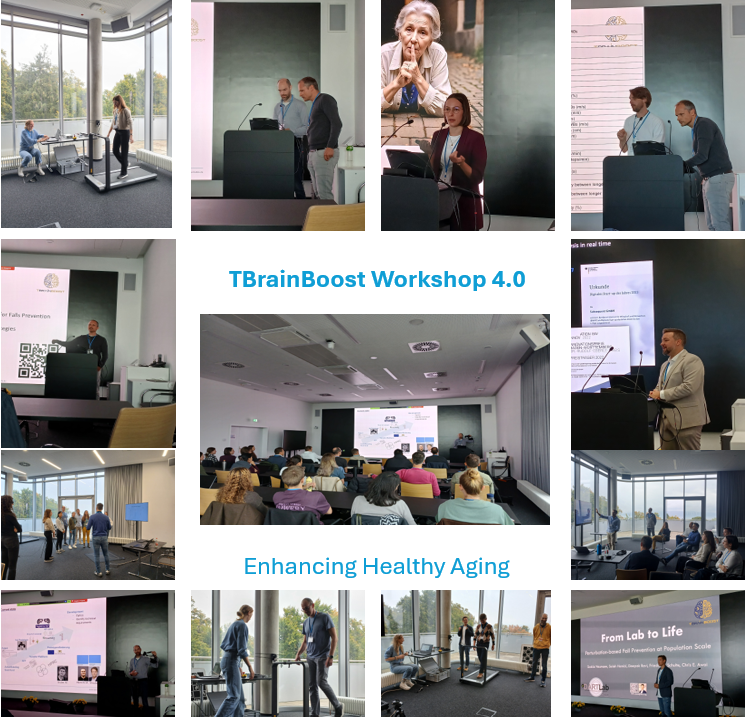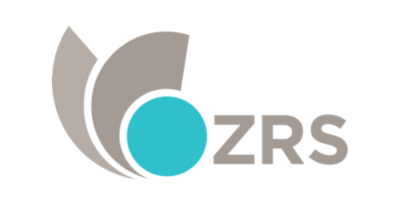We just concluded the TBrainBoost Workshop 4.0, a three-day international event dedicated to exploring innovative approaches for promoting healthy aging through neuroscience, motor control, and technology transfer. Held from October 7 to October 9, 2025, at the University of Konstanz (Germany), this workshop brought together researchers, clinicians, and technology developers to discuss and demonstrate how scientific advances can be transformed into impactful real-world applications for balance, mobility, and fall prevention.
Day 1 (October 7, 2025):
The event began with an EU RIA Proposal Meeting to coordinate upcoming research collaborations in the field of falls prevention and healthy aging, followed by a welcome dinner, where workshop speakers had the opportunity to connect informally.
Day 2 (October 8, 2025):
The day opened with greetings from Markus Gruber and Michael Schwenk (University of Konstanz), setting the stage for a dynamic program of scientific presentations and applied research discussions.
Block 1 – Technology-based Balance Training for Falls Prevention: From Lab to Patient to Market
- Lorenz Assländer (University of Konstanz) discussed Augmented Visual Orientation Cues as a strategy to mitigate vertigo and reduce fall risk.
- Eleftheria Giannouli (ETH Zurich) presented on Cognitive-Motor Exergame Training and its journey from theoretical development to clinical application.
- Christian Werner (Heidelberg University) explored the dose-response relationship of perturbation treadmill-based balance training.
- Vanessa Haug (University Hospital & University of Applied Sciences, Ulm) introduced #FallCheck and #FallVaccine as innovative clinical approaches to fall prevention.
- Chris Awai (Lake Lucerne Institute) closed the block with insights on how to bring perturbation-based balance training from the lab into the real world.
After a lunch break, participants reconvened for the next thematic block.
Block 2 – Novel Assessment and Treatment Strategies: From Lab Research to Real-world Impact to Digital Innovation
- Uroš Marušič (ZRS Koper) showcased Mobile Neuroimaging methods for studying balance and locomotion.
- Carl-Philipp Jansen (Heidelberg University Hospital) discussed real-world gait assessment using the Mobilise-D approach.
- Kevin De Pauw (Vrije Universiteit Brussel) shared strategies for bridging innovation and robotics technology to advance rehabilitation tools.
- Laurisa Arenales Arauz (Vrije Universiteit Brussel) addressed fatigue as a societal challenge and its relevance for health innovation.
The day concluded with a wrap-up session led by Michael Schwenk, followed by a networking dinner, providing further opportunities for collaboration and exchange.
Day 3 (October 9, 2025):
The final day was fully interactive, with participants rotating through a series of hands-on workshops held in the Data Theatre:
- Markerless Motion Tracking using smartphone video recordings (Daniel Seebacher & Manuel Stein, Subsequent GmbH).
- Mobile Perturbation-based Balance Training (Chris Awai, Lake Lucerne Institute).
- Cognitive-Motor Exergame demonstration (Mitja Gerzevic, Alma Mater Europaea University).
- Sensory Integration for Human Balance Control (Lorenz Assländer, University of Konstanz).
- AI Made Easy: Classifying Walking Patterns with Python and Open Data (Matevž Vremec, Alma Mater Europaea University).
The sessions offered participants practical insights into how technological and neuroscientific tools can be applied directly in clinical and community contexts. The workshop concluded with a group discussion and closing remarks, emphasizing the importance of interdisciplinary collaboration for advancing healthy aging.
We extend our heartfelt thanks to all speakers and organizers, including Markus Gruber, Michael Schwenk, Lorenz Assländer, Eleftheria Giannouli, Christian Werner, Vanessa Haug, Chris Awai, Uroš Marušič, Carl-Philipp Jansen, Kevin De Pauw, Laurisa Arenales Arauz, Daniel Seebacher, Mitja Gerzevic, and Matevž Vremec for their valuable contributions.
Special thanks also go to the University of Konstanz for hosting the event and to all TBrainBoost partners for supporting the translation of neuroscience into innovation for healthy aging.



